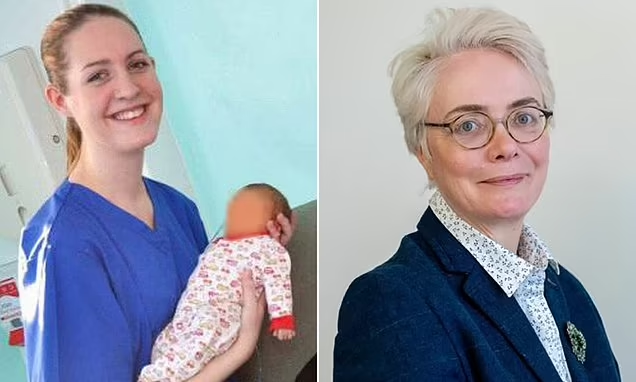The Lucy Letby case sent shock waves across the medical world and into society itself. Letby, a highly trusted nurse at the Countess of Chester Hospital, faced conviction for seven counts of baby murder and attempted murder between June 2015 and June 2016. The story becomes even more unsettling as more details surface during the Thirlwall public inquiry, showing there were serious failings on the part of the NHS in response to such tragic deaths.
The Dark Nickname: “Nurse Death”
The investigation revealed that the junior doctors in the hospital had nicknamed Lucy Letby “Nurse Death.” The dark citation indicated the growing suspicion among the medical staff regarding the tragic baby deaths observed during her shift. The presented evidence indicates that several doctors have expressed their suspicions about a potential connection or link between Letby and all these tragic incidents. The head of nursing further testified that paediatricians had repeatedly remarked that Letby was the “common denominator” behind the mysterious deaths.
The Trust’s response, despite such alarming concerns, was lethargic. In fact, Nicholas de la Poer KC, appearing for the inquiry, revealed that Letby had even attempted to murder a baby during a hospital inspection, further showing how deep the flaws in the checks and balances in the system were then.
A Timeline of Missed Warnings
The murders lasted 12 months, but suspicion had been mounting for much longer before Letby’s arrest. In 2019, medical director Ian Harvey said paediatricians had likened Letby to the “elephant in the room” when discussing the cause of the spate of mysterious baby deaths. The police did not become formal suspects until 2017.
Mr. Harvey revealed that the junior doctors had threatened to report the matter to the police due to their perceived lack of seriousness. However, the hospital hesitated to take action, citing a desire to “unite before taking drastic measures.” Such delays may have cost more lives.
Broken systems and delayed response

The investigation has uncovered a number of failures on the part of the management. Despite observing an increase in infant deaths between 2014 and 2015, the issue remained unresolved. According to statistics released before the regional neonatal network steering group, the number of infant deaths had risen. However, the hospital never regarded this as a high-risk case for the infants’ safety, instead rating the risk as potential damage to its reputation.
During the same period that Letby attempted to kill Baby K, the hospital was being inspected by health regulators from the Care Quality Commission. It was surprising that during these inspections, no mention was made of neonatal mortality, despite the staff’s serious concerns. Dr. Stephen Brearey, the lead consultant on the neonatal unit, stated that the inspection never addressed the issue of neonatal mortality. The failure of the inspectors to raise this issue raised numerous questions about how such a critical issue could go unnoticed.
Cheshire Police Role
It wasn’t until May 2017 that Cheshire Police opened a criminal investigation into the deaths. This followed only after a meeting of senior consultants and police, where the consultants went over in considerable detail why they believed there had been foul play. Previously, Mr. Harvey had sought to play down the issue, saying the consultants’ concerns were a “prejudiced view” that pointed toward one nurse.
In fact, when Harvey spoke to NHS England, he seemed more concerned with putting a stop to rumors than true justice. He presumably hoped the police would help the Trust “close down the speculation” over Letby’s role. The neonatal unit may have suffered further harm as a result.
The police quickly realized the severity of the situation after receiving adequate information. The conference between the consultants and Cheshire Police on May 17, 2017 was a “critical and important event,” which made the police decide to start a criminal investigation. The inquiry has heard how this delay in police involvement contributed to the continuation of Letby’s killing spree.
Moving Forward: Lessons to be Learnt
The Lucy Letby case unfolded not only as a story of an individual’s heinous crime, but also as a tale of systemic failure within the NHS. The entire sequence of events, from the moment medical professionals began voicing their concerns about her actions to the present, is disturbingly reflective of how the hospital’s reputation has been prioritized over patient safety, and how regulatory bodies such as the CQC have failed miserably in their roles.
This question is crucial for improving the situation and ensuring that it doesn’t occur again. Medical staff ignored those who tried to raise the alarm, resulting in the deaths of babies. As more details emerge, this case not only illuminates Letby’s crimes but also serves as a wake-up call for the health care system to prioritize patient safety.
Conclusion

Lucy Letby, dubbed “Nurse Death” by those who knew her, is the most serious case in the history of the NHS and to a large extent of the medical profession. The inquiry continues to uncover graphic details about the disregard for warnings and the missed opportunities to prevent her, bringing this tragedy into sharper focus. Now, healthcare leaders must learn from these devastating failures and ensure that patient safety never compromises again.




